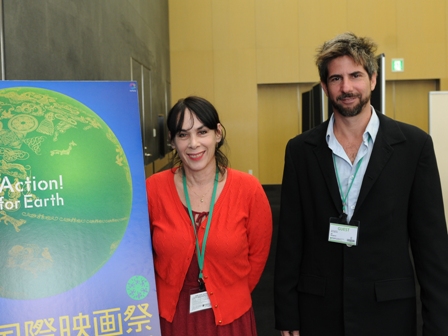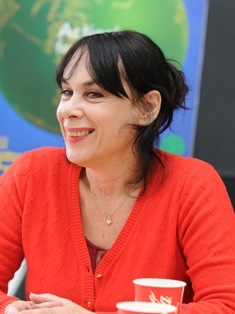2010.11.01
[Interviews]
Competition ŌĆ£Intimate GrammarŌĆØ Interview with Nir Bergman (Director) and Orly Zilbershatz (Actress)


©2010 TIFF
---Family may be an epitome of society, as well as an effective medium to explore deeper into the inner aspect of individuals, but why did you choose a story of a family again after your previous work?
Nir Bergman (Bergman): This film is set in the era of high spirits to create a new country where Holocaust would never happen again. The priority at the time is to build up military power more than anything, leaving no place for people with sensitive and artistic minds. I believe a story of an individual and relationship within a family is always an effective means to portray a country and society.
Another reason is that I myself am very interested in a dysfunctional family, and also I wanted to show a childhood before a child is bound by adultsŌĆÖ rules. Children of AharonŌĆÖs age wonder about all sorts of things. What Aharon questions is what people in modern Israel have ceased to question any longer as they concentrate their efforts on making the country strong.
This film calls for sympathy and care for people who are different. It has a strong message that everyone should mutually accept differences, not just within a family but in the whole region where Israelis and Palestinians live side by side.

©2010 TIFF
---The films shows ceremonies such as Rite of passage and Bar Mitzvah that signify an individual joining a group, while Aharon repeats escapade attempts as Houdini, an escape artist. He also sneaks into a room belonging to his neighbor, Edna, and makes it as his hideout.
Bergman: Aharon is not capable of behaving like any other children. He has something different inside, and for that reason he needs to feel he is a special person, and that special person is for example an artist. In the scene of the ritual of fire, he has to go through the ring twice, but he is deemed arrogant and punished. Such a punishment will continue in his life. In the last scene of the Independence Day, did you notice Aharon is standing in a completely different group of people? Aharon must find the answer by himself how he can survive in the country.
---In EdonaŌĆÖs room which becomes AharonŌĆÖs hideout, pictures and books line the wall, but the trees outside are cut down, a wall is taken down, the piano is sold, and in the end it looks like a bomb site. Does this signify a social aspect?
Bergman: Perfect interpretation. That signifies the death of culture. Edna symbolises culture and art, and her room is the only place for Aharon to be in touch with such things. But Edna wants to be loved by AharonŌĆÖs father and asks him to take down the wall. The effect of war is not limited to the experience of war itself, but it destroys other things to create secondary trauma. Edna experiences this secondary trauma and is unloved. A lavish dinner with all family members does not mean the effect of war has gone. I wanted the audience to feel that the past remains with them.
---What is your interpretation of the mother?
Orly Zilbershatz (Zilbershatz): She is mean and aggressive, but she is a Holocaust survivor. Surviving was all they could do for people in those days. So she has no idea how to deal with a child with an artistŌĆÖs mind. She worries for his future so much as his mother. There is nothing good that can happen if he does not fit into society. So she is obsessed with the idea that he should not become a gentle man.

©2010 TIFF
---You were in BergmanŌĆÖs previous film, too. How do you see the work with Bergman in terms of your career?
Zilbershatz: We have been friends for many years. Nir can bring out strengths which I did not even know I had, and I trust him completely. This film was a big challenge. The previous work was a success, so the temptation was there to make another film in the same way, but we wanted to avoid that. I played this mother in a way that I would feel satisfied for taking on a new challenge, even if this film was not perfect.
Aharon, who is learning English, shows a particular interest in the ŌĆśpresent progressive formŌĆÖ. His friends discard childhood as ŌĆśpastŌĆÖ in the process of growing up as adults, but Aharon refuses to so do. Similarly, Bergman reconstructs past and present, war and daily life, self and others in a present progressive form rather than discarding something. This film has explored such a profound world, and I would like to offer my heartfelt congratulations for achieving the Tokyo Sakura Grand Prix this year after 8 years.
(Interviewed by Masaaki Oba)
Intimate Grammar
ŌåÆFilm Infomation




